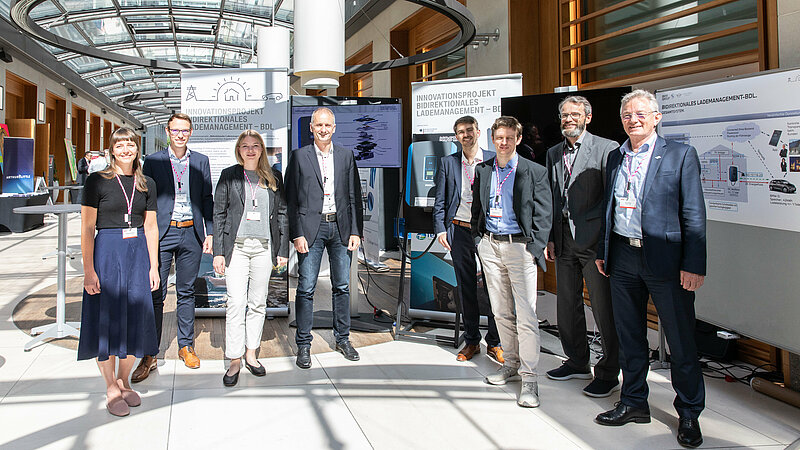Berlin, 10. & 11.05 2022 | Auf dem 16. Internationalen MTZ-Kongress präsentierte sich Berlin unter dem Motto "Powertrains and Energy Systems of Tomorrow/ Antriebsstränge und Energiesysteme von morgen". Der Kongress richtete sich an Ingenieure, Führungskräfte sowie an Experten aus Industrie, Politik, NGOs und wissenschaftlichen Instituten, welche sich mit der Entwicklung von Antrieben, der Erzeugung und Verteilung von Strom, dem Ausbau und der Integration des Stromnetzes, internationalen Märkten, Produktionsnetzwerken und Lieferketten beschäftigen.
Die Veranstaltung bot eine hervorragende Gelegenheit, das BMWK-geförderte Projekt "Bidirektionales Lademanagement – BDL" aus unterschiedlichen Perspektiven vorzustellen. Neben Einblicken über das Gesamtsystem und zu regulatorischen Rahmenbedingungen wurden erste Ergebnisse aus der Realerprobung im Pilotbetrieb des Projektes sowie aus der Nutzerforschung gezeigt.
Franziska Kellerer und Johanna Zimmermann präsentierten im Rahmen des Kongresses einen Artikel zum Thema „Creating and sustaining user engagement in bidirectional charging“ („Anreize und Stellhebel für nachhaltige Kundenbindung im Kontext des bidirektionalen Ladens“), welcher in Zusammenarbeit mit Sebastian Hirsch und Dr. Stefan Mang, entstanden ist.
Kellerer, F., Zimmermann, J., Hirsch, S., Mang, S., (forthcoming). Creating and sustaining user engagement in bidirectional charging. 16th International MTZ Congress Powertrains and Energy Systems of Tomorrow 2022, Berlin, Germany.
Abstract
Encouraging users to buy and continuously engage in bidirectional charging represents a crucial factor determining the long-term success of the technology. However, user research in the context of smart charging has mainly focused on investigating overall perceptions and factors motivating consumers to buy the technology. In this article, we aim to take a more specific perspective on user acceptance of the technology by investigating both, their preferences with regard to the design of the business model of bidirectional charging as well as the design of app feedback mechanisms for creating long-term user engagement. Our findings reveal that financial aspects (i.e., preferred contractor, type of compensation, willingness to initially invest in the technology) constitute an important factor impacting user participation in bidirectional charging. In the long run, however, users’ non-financial motivation must also be addressed. Therefore, study 2 sheds light on how to foster users’ charging behavior by implementing gamified app feedback (i.e., financial, social and efficient energy use). With this article, we contribute to user research, which has been largely neglected in the highly technology-focused field of bidirectional charging.
Wir bedanken uns herzlich für die Einladung und Organisation sowie bei allen Referentinnen und Referenten der Tagung für die spannenden Einblicke.
